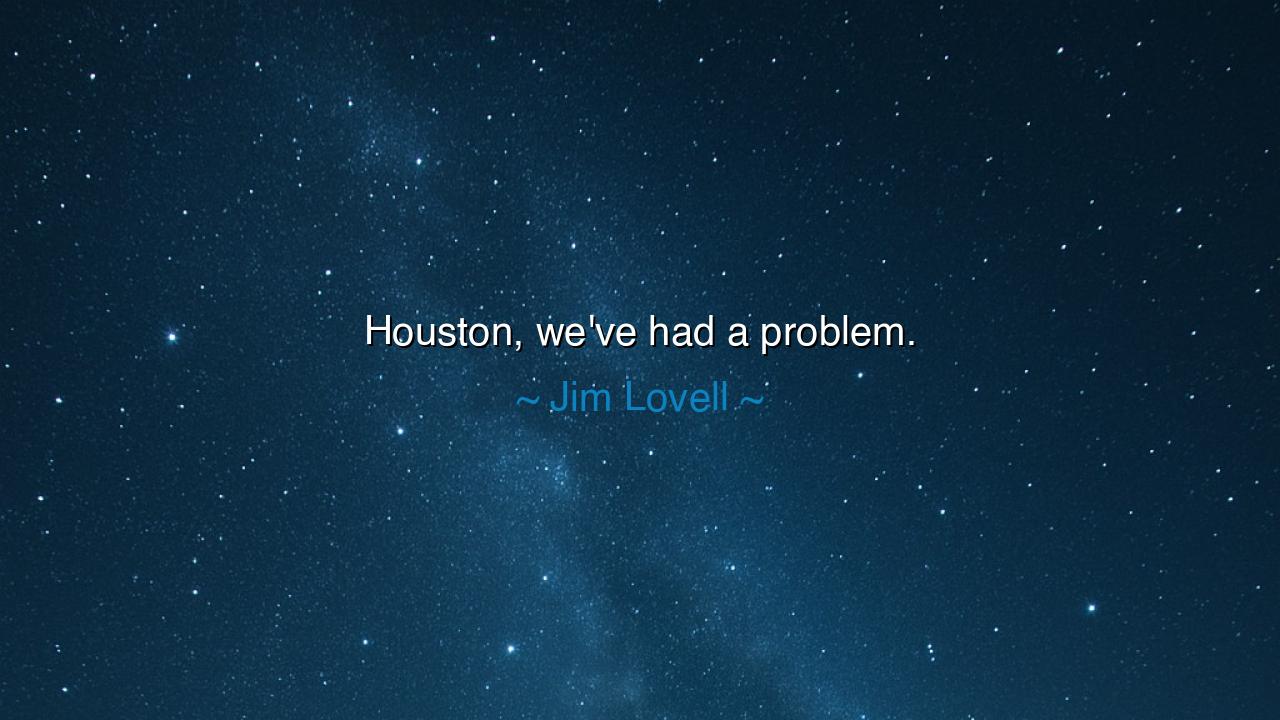
Houston, we've had a problem.






In the vast and uncharted territories of space, where the cold embrace of the cosmos offers no solace, there comes a moment when all that is known, all that is trusted, is called into question. Jim Lovell, a man whose name will forever be entwined with humanity’s journey to the stars, spoke the words that would become etched into history: "Houston, we've had a problem." These words were not merely a statement of fact, but a moment of truth, a declaration that, even in the greatest of human endeavors, trouble can arise unexpectedly, and that the path ahead is not always certain, no matter how carefully we prepare.
The context of these words comes from the ill-fated Apollo 13 mission, where Lovell, along with his crew, found themselves stranded in space after a critical failure of their spacecraft. Their mission, which had once seemed a simple journey, turned into a fight for survival. The phrase "Houston, we've had a problem" captures the moment when all the technology, all the training, and all the preparation in the world could not foresee the dangers that awaited them in the vastness of space. The problem was not just a mechanical failure; it was a realization that in the face of the unknown, even the best plans can be disrupted.
Think, O children of the future, of the ancient explorers who set sail across vast oceans, unsure of what lay beyond the horizon. They, too, encountered moments when their ships encountered unknown forces, when the wind shifted unexpectedly, and when their very lives hung in the balance. Christopher Columbus, when he first set sail toward the New World, had no assurance that the waters he crossed would lead to land. But like Lovell, he did not turn back in the face of uncertainty. The bravery of such moments is not in the absence of fear or doubt, but in the resolve to act in the face of danger and the unknown. “Houston, we’ve had a problem,” was not a moment of despair, but of clarity, a recognition that adversity is an inevitable part of any great undertaking.
Lovell’s words also speak to the nature of human resilience—how we respond to a crisis defines not just the course of a mission, but the course of our lives. In the face of disaster, the Apollo 13 crew did not succumb to panic. Instead, they called upon the strength of their training, the wisdom of their supporters, and their own resolve. In this, they became a shining example of what it means to face the unknown with courage. The problem they faced was not just mechanical, but existential, a confrontation with the very limits of human capability. Their survival was not guaranteed, but their will to overcome the problem was.
The wisdom in Lovell’s simple statement is that it acknowledges the inevitable nature of challenges and uncertainties in life. Just as the astronauts did not anticipate the mechanical failure that led to their perilous situation, we, too, face moments in our lives when the unexpected arises, when our best-laid plans are tested by circumstances beyond our control. Yet, as great philosophers have taught, it is not the nature of the problem that defines us, but how we respond to it. Marcus Aurelius, the Stoic emperor, spoke of accepting what happens, not as fate’s burden, but as an opportunity to practice virtue, to act with purpose, and to maintain composure in the face of hardship.
In our own lives, the lesson of Lovell’s words is clear. There will be moments when the path ahead seems uncertain, when obstacles arise that challenge our very sense of purpose. But it is in these moments that we must be like Lovell and his crew—calm, clear-headed, and resolute in our determination to find a solution. We must remember that a problem, however large, is not an end, but a beginning—a beginning of growth, of innovation, and of the strength of the human spirit. Just as Lovell and his crew worked with mission control to find their way back to Earth, so too must we work together, with wisdom and cooperation, to navigate the challenges of life.
So, O children of the future, when you face the inevitable moments of uncertainty, remember that the greatest problem is not the challenge itself, but the choice to face it with courage. Like the explorers of old, like Lovell and his crew, let us embrace the difficulties that come our way, knowing that they are not signs of failure, but tests of our resolve. The journey will not always be smooth, but with courage, wisdom, and unity, there is no problem too great to overcome. Let the legacy of those who have journeyed before you guide you as you take your own steps into the unknown. The world is vast, and its challenges many, but remember always: in every problem, there is the seed of growth, and in every crisis, there is the chance for heroism.






AAdministratorAdministrator
Welcome, honored guests. Please leave a comment, we will respond soon